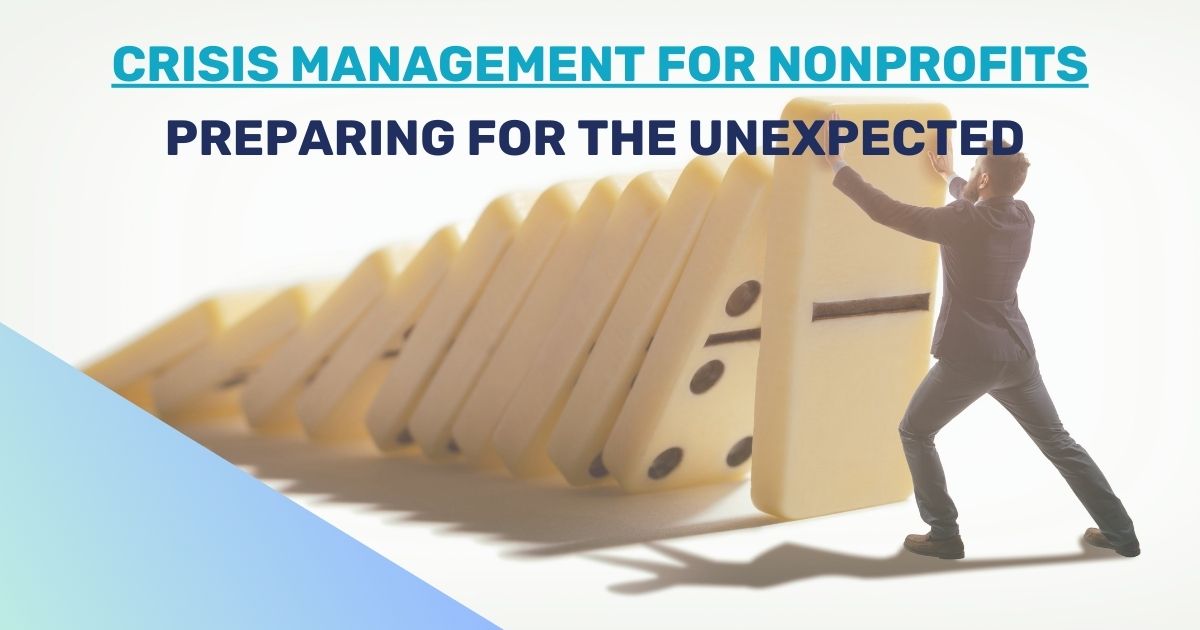

Crisis Management for Nonprofits: Preparing for the Unexpected
In the world of nonprofits, unforeseen challenges can arise at any moment, threatening an organization's mission, reputation, and even its very existence. Whether it's a financial crisis, a reputational hit, or an operational setback, having a proactive crisis management plan in place is crucial to navigate these rough waters. Not only does it help you address the crisis effectively, but it also maintains the trust of your donors, volunteers, and the public. We'll explore the ins and outs of crisis management for nonprofits and offer valuable insights on preparing for the unexpected.
Understanding Nonprofit Crises
Before diving into crisis management, let's define what constitutes a crisis in the nonprofit context. A crisis is any situation that poses a severe threat to the organization's ability to carry out its mission or maintain its reputation. Crises can come in various forms, including:
1. Financial Crises: Sudden drops in funding, financial mismanagement, or unexpected expenses can lead to financial crises that put the organization at risk.
2. Reputational Crises: Negative publicity, scandals, or damage to the nonprofit's image can erode public trust and donor confidence.
3. Operational Crises: These can include internal issues such as leadership conflicts, data breaches, or major program failures.
The Significance of Crisis Management
Effective crisis management is not just about damage control; it's about safeguarding the long-term sustainability of the nonprofit. Here's why it matters:
1. Maintaining Public Trust: How an organization handles a crisis can have a lasting impact on public perception. A well-managed crisis demonstrates transparency, responsibility, and a commitment to making things right, which helps rebuild trust.
2. Donor Confidence: Donors want to ensure their contributions are used effectively. A nonprofit that can effectively manage a crisis and continue its mission is more likely to retain donor support.
3. Mission Continuity: Proper crisis management ensures that the organization can continue working toward its mission, even in challenging times.
Elements of a Nonprofit Crisis Management Plan
A robust crisis management plan comprises several key elements, each playing a critical role in navigating crises effectively.
Risk Assessment and Identification
Before you can effectively manage a crisis, you need to understand what potential risks your nonprofit faces. This involves conducting a thorough risk assessment, which includes:
- Identifying Vulnerabilities: Recognize areas where your organization may be most vulnerable to crises.
- Understanding Consequences: Assess the potential consequences of each identified risk.
- Assessing Likelihood: Determine the likelihood of each risk occurring.
Forming a Crisis Management Team
Once you've identified potential risks, it's time to create a dedicated crisis management team. This team should consist of key members from your organization who are responsible for:
- Decision-Making: Making critical decisions swiftly during a crisis.
- Communication: Managing internal and external communications to maintain transparency.
- Resource Allocation: Allocating funds, personnel, and other resources as needed.
Crafting a Communication Strategy
Transparency and clear communication are paramount during a crisis. Your communication strategy should include:
- Honesty: Be open about what happened, what you're doing to address it, and what changes will be made.
- Consistency: Maintain a consistent message across all communication channels.
- Stakeholder-Specific Messaging: Tailor messages for donors, volunteers, staff, and the public.
Resource Allocation and Response
In times of crisis, resource allocation becomes a critical aspect. This involves:
- Funding: Allocating financial resources to respond effectively.
- Personnel: Mobilizing staff and volunteers to manage the crisis.
- Adaptability: Being flexible in adjusting resources as the situation evolves.
Monitoring and Evaluation
Crisis management doesn't end when the immediate threat is over. It's essential to:
- Assess the Response: Analyze how well your organization addressed the crisis.
- Learn and Adapt: Use the crisis as a learning opportunity to improve your crisis management plan.
Preparing for the unexpected is a fundamental responsibility for nonprofit organizations. Here is the Case Study of How two nonprofits handled crisis. By developing and implementing a proactive crisis management plan, you can not only respond effectively to unforeseen challenges but also maintain the trust and support of your stakeholders. Remember, a crisis is not just a threat but an opportunity to demonstrate your commitment to your mission and the community you serve.
